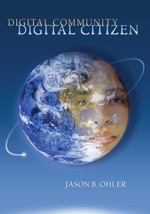
Digital Community, Digital Citizen – Jason B. Olher
I’ve been lucky enough to spend a morning with Jason B. Ohler, author, educator and “nowist” (as distinct from “futurist”). Jason’s book Digital Community, Digital Citzen, explores cultural schism between the status quo focus in education of standardised testing on old-fashioned text and the world of new media and literacies in which our students exist. Ohler presents a detailed case for understanding where our kids are and using “stories” as a container for how we understand, consume, create and analyse new media. Ohler suggests that we need to:
1. shift from text-centrism to new media literacies;
2. value writing more than ever and understand good media is still based on good, clear writing;
3. specifically value writing for media;
4. adopt art (creativity, improvisation, risk-taking and critical/creative practices) as the “4th, next R.”
5. accept that “attitude is the aptitude” – that everything’s going to change, and we shouldn’t get attached to the way things are… e.g. Excel 6 is going to become Excel 7, and If you haven’t got the ability to let go, you are “functionally unintelligent.”
6. practise personal and social literacy – literacy is no longer a social pursuit – e.g. wikis, blogs and online collaborative writing now happens in groups – therefore we should take our literacies and combine it with others’;
7. develop literacies about different tools;
8. develop literacies about information in the real world; and
9. understand that digital communities and citizenship are about fluency, not just literacy.
Embracing and Understanding Stories
Much of Olher’s engagement stems from his understanding of stories in digital cultures as “information containers that can hold lots of disparite data.” Ohler believes that teachers need to harness and embrace stories in the classroom, suggesting that stories naturally align with how students – even very young ones – view and understand the world. If we continue to focus on “list-oriented information,” we lose the engagement of our students and alienate them from learning partnerships.
Ohler has a strong message on the role of teachers in the story-telling process: while we don’t need to be “software afficionados,” we do need to be critical and not simply give an A grade for “anything that moves.” Our roles as critical/creative consultants need to reflect how professional mediasts approach creative development.
Ultimately, Ohler makes a compelling argument to overcome the schism between real learning and high-stakes standardised testing, thus overcoming the “cognitive dissonance” that derails authentic learning. If schools start young kids engaging with real issues, finding learning pathways and understanding and relating their learning through stories and story-telling, there is real potential in the future. Speaking of the future, Ohler reminds us that the future “goes for a very long time” and not simply “as long as we’re alive.” With this in mind, we need to prepare our students (and their students!) for the next several hundred years! Let’s get started!






I love the ideas Jason talks about. On another note, am fascinated to see the Toffler quote touted again. When Dean and I were writing out books we also wanted to use that quote, and of course had to follow up the attribution. This much quoted quote does NOT exist, but is a sentiment that obviously resonates over and over in the digital airwaves! Very glad that your presentation went so well yesterday, especially after the twitter ‘shoutout’ to swell the crowds!
Hey Judy!
Thanks so much for the comment and virtual feedback 🙂 Fancy the quote not being a quote? Anyways – I deleted it… maybe I could have just written, -anon? 😉
Would love to catch up with you some time – perhaps a tweet-meet!
Talk soon,
M